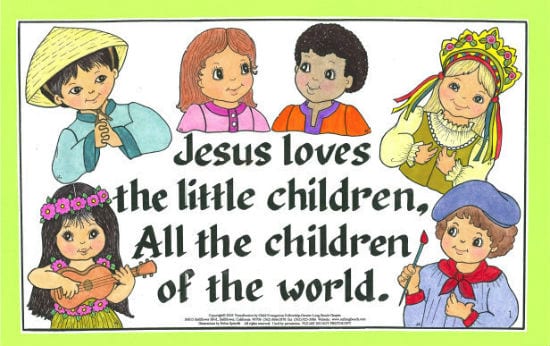• Susan M. Shaw on “How complementarianism became part of evangelical doctrine.”
I am old, but I’m not that old, so when I say that everything in this story occurred within my lifetime, that should tell you something about the claims of these folks to be “traditionalists.” The big manifesto introducing and proclaiming “complementarianism” came out in 1987 — the same year as Moonstruck and Lethal Weapon. That was the year after “Livin’ on a Prayer” came out, which is to say it was four years after “Runaway” first hit the airwaves, and I’m not impressed by the argument that something carries the weight and authority of “tradition” if it hasn’t been around for as long as Bon Jovi has been on the radio.
• James McGrath ponders the need to recraft the lyrics to the beloved old Sunday-school song “Jesus Loves the Little Children.” As he notes, the song’s central message is wonderful: every child, everywhere, is beloved by God. But it’s now a bit jarring and anachronistic to sing, “Red and yellow, black and white / they are precious in God’s sight.”
I’ve discussed this song, and this line in this song, a few times here, noting that the line now seems awkward not just in the Sunday-school song but in John & Yoko’s allusion to it in “Happy Christmas (War Is Over).”

“Jesus Loves the Little Children” was my grandmother’s favorite song. I mentioned, when telling “The Grandma story,” that she’d always lose when she played “Mastermind” with her grandchildren because her hidden pegs were always red and yellow, black and white. This was, for Grandma, a missionary song, capturing the indiscriminate nature of the missionary zeal of her strain of Great Commission fundamentalist Christianity. That missionary emphasis rescued Grandma from the most explicit forms of Christian nationalism (even though she was a big Peter Marshall fan). It couldn’t rescue her white fundie faith from its utter entanglement with white supremacy, but it steered her toward the more “benevolent,” Kipling-esque form of that found in the 19th-century missionary movement (which is maybe not quite better, but perhaps less aggressively bad?).
For my grandmother, the first verse — “Jesus loves the little children, all the children of the world” — entailed the second verse, “Go and tell the little children …” I don’t want to veer off here into a longer discussion of “child evangelism,” in which the creepy paternalism of 19th-century missiology tends to shine brightest, but let’s also note that this verse of the song might also benefit from a bit of rethinking.
Not sure how this song’s message of indiscriminate divine love squared with Grandma’s strict Calvinist belief in limited atonement, but Grandma was large, she encompassed multitudes.
Anyway, I remain fond of this well-intentioned if imperfect little song. It may be as sappy, sentimental, and simplistic as “War is over, if you want it,” but the ideals behind such apparent platitudes are still valuable.
• If you’ve ever wondered about their namesakes, here’s Jan Edmiston on the Robert of Robert’s Rules of Order and here’s Erik Loomis visiting the American grave of the Dewey of the Dewey Decimal System.
Melvil Dewey, it turns out, was a despicable jerk — a lecherous misogynist, racist, and antisemite. (“Do you realize just how over the top antisemitic you had to be in 1906 to lose your job over it?”) Henry Martyn Robert, on the other hand, was a mensch. He was the son of an abolitionist Baptist preacher who fought for the American side of the Civil War and eventually composed his rules (in 1876) in an effort to make Baptist church meetings less chaotic.
• Daniel José Camacho’s Revealer piece on “The Internet’s Unofficial Patron Saint,” happily, does not conclude with Isidore of Seville turning out to be a milkshake duck.
Reading that had me musing about other potential candidates for unofficial patron saints of the internet and thus thinking of Craig Shergold — one of the first “viral” internet celebrities and, subsequently, one of the first internet-driven urban legends. I was saddened to learn, via Wikipedia, that Shergold died last year from COVID. He was 40.
Shergold’s death in 2020, alas, will not stop thousands of people in 2021 from sending birthday cards to 9-year-old Craig Shergold, or to “Greg Sherwood” or Draing Sherold. Those cards will keep coming to the former address, which still has its own designated postal code.
• The title of this post comes from “Pump It Up” on the 1978 Elvis Costello album This Year’s Model. That was also the year of the “Chicago Statement on Biblical Inerrancy” — “biblical inerrancy” being another concept often marketed as “traditional” when, in fact, it’s younger than Disco, Punk, or New Wave.
Here’s the official music video for “Pump It Up,” because official music videos were already a thing before the ancient tradition of “biblical inerrancy” was codified.












